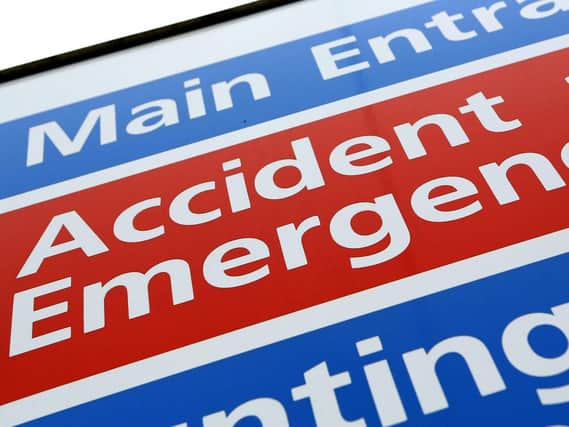Plan to ban A&E walk-ins without referral


The "talk before you walk" scheme would mean patients could not just turn to A&E for help without first seeking advice elsewhere.
Dr Helen Thomas, national medical adviser for integrated urgent care at NHS England, told a conference that it "may well pilot" such a scheme - with the backing of the Health Secretary - in a bid to cut down the numbers attending A&E.
Advertisement
Hide AdAdvertisement
Hide AdBut the British Medical Association (BMA) and College of Emergency Medicine said the plan was misguided and the pressure on A&E departments was actually due to seriously ill people needing care.
Dr Thomas said talks were at an early stage but added: "Jeremy Hunt has mentioned to some of my colleagues, maybe we should have a "talk before you walk" and we may well pilot that.
"I think it's been done in other countries where they've actually said you can't come into ED (emergency department) until you've talked on referral or you have to have that sort of docket that you're given by having talked on the phone that you do need to come to ED."
She admitted piloting such a scheme would be a political "hot potato".
Advertisement
Hide AdAdvertisement
Hide AdSpeaking at the Urgent Health UK conference, reported in Pulse magazine, she said that out of 100 patients that come to A&E "only 20 have called 111".
She said: "So I think that other 80 - there is opportunity there. Some of them will need ED but there's an awful lot that won't."
The Government is already introducing GPs across A&E departments to act as a "gateway" to emergency care.
But the scheme has attracted intense criticism, with the BMA warning that the move could actually encourage more people to go to hospital inappropriately.
Advertisement
Hide AdAdvertisement
Hide AdResponding to the latest plan, Dr Chaand Nagpaul, chairman of the BMA, said: "Trying to solve a problem in one part of the NHS by shifting it on to another won't work.
"Pressure on emergency departments is down to seriously ill patients and a lack of capacity and funding across the whole system.
"All this proposed system would do is add an extra layer of bureaucracy for patients and an extra burden on the NHS, GPs, or other clinicians.
"It could also have the added effect of increasing the burden on the ambulance service as people could instead just call an ambulance to get a place in A&E."
Advertisement
Hide AdAdvertisement
Hide AdFigures from NHS Digital show that 37% of people going to A&E are discharged with no follow-up needed, while 20% are discharged to their GP and 20% are admitted to hospital.
Mr Hunt has told MPs that up to a third of patients do not need to be seen in A&E.
In 2014, Mr Hunt took his own children to A&E because he did not want to wait to see a GP.
But Chris Moulton, vice president of the Royal College of Emergency Medicine, said data showed that British people "do not attend A&E more often than in any other country in the developed world".
Advertisement
Hide AdAdvertisement
Hide AdHe added: "This is blaming the patient for problems in the system.
"Most of those needing hospital care have complex conditions, they are older people, those with cancer and those who need genuine care.
"These people that they are saying they want to divert are not the ones filling the beds."
He said the college's own estimates were that 15% to 20% of people in A&E could be treated by a GP and it was a fallacy to suggest most people in A&E were time-wasters.
Advertisement
Hide AdAdvertisement
Hide AdAn NHS England spokesman denied there were any plans to change the current system.
He said: "It is wrong to suggest or imply that the NHS will do anything other than continue to provide A&E care for all patients who need it, nor are there any plans to prevent patients from visiting A&Es alongside the other options now available for non-urgent care such as NHS 111 or urgent treatment centres."
A Department of Health spokeswoman said: "There are absolutely no plans to pilot this approach - patients can be reassured that unprecedented planning has gone in to preparing the NHS for this winter, supported by an extra £100m for A&E departments and £2bn for the social care system."
Professor Helen Stokes-Lampard, chairwoman of the Royal College of GPs, said: "Our understanding of this proposed pilot scheme is that it will involve phone referrals to A&E via NHS 111 - it will not involve patients having to make additional visits to their GP before they can attend A&E.
Advertisement
Hide AdAdvertisement
Hide Ad"However, if what is being reported is the case, then this would be completely counter-productive.
"Pressures in the NHS are not restricted to emergency departments - intense workload and workforce issues are being faced in general practice too, and this would simply create further capacity problems, and increase bureaucracy for a profession already drowning in it.
"We know that the main issue contributing to pressures in A&E is not inappropriate attendance, but a lack of hospital beds, and a lack of the community support services patients need when they are discharged, so they end up staying in hospital for longer than they needed to."